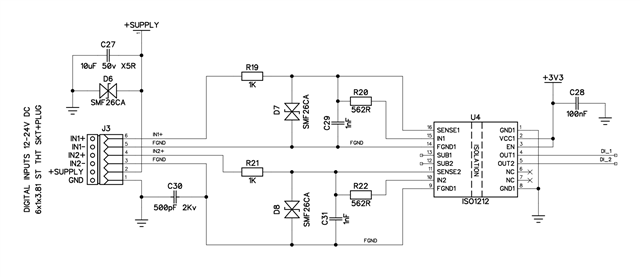Tool/software:
Hi all,
We're using ISO1212 in a design, and followed this reference:

Rthr 1k Ohm and Rsense is 562 Ohm, and we're using a SMF26CA TVS. Below is our schematic:

When Rthr for IN1 is 1k Ohm, when I connect +SUPPLY(24V) to IN1+ and GND to IN1-, I do not see OUT1 go high on the ISO1212.
However when Rthr for IN2 is 0 Ohm, and I do the same as above, I do see OUT2 go high.
I found this forum post with the same issue, however with no satisfying answer aside from it might be broken:
With a 24V supply, in relation to GND, I measure:
- SENSE1 = Approx 4.8V
- IN1 = Approx 3.7V
- Approx 1V across Rsense
My understanding from the datasheet is that a Rthr of 1k Ohm means that a voltage above 11V on IN1 should mean OUT1 goes high?

Any assistance in understanding would be greatly appreciated. I can provide more information as needed.
Cheers,
Daz


